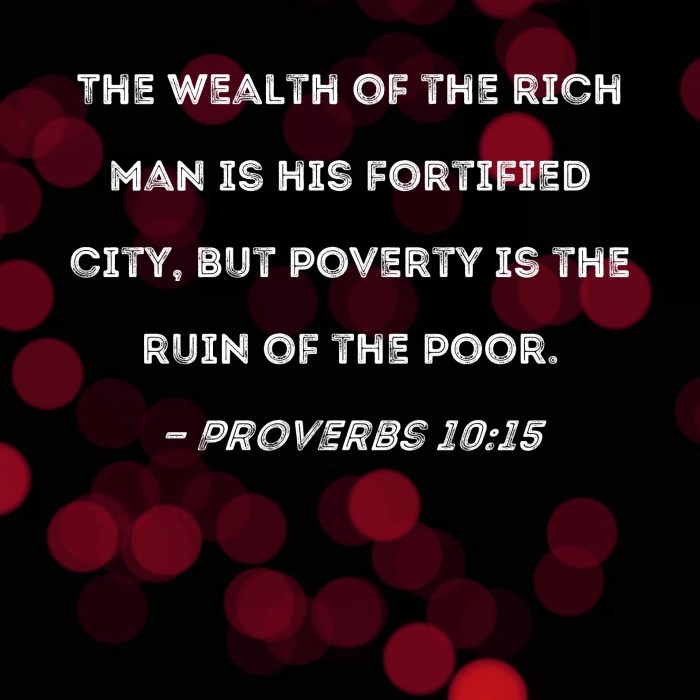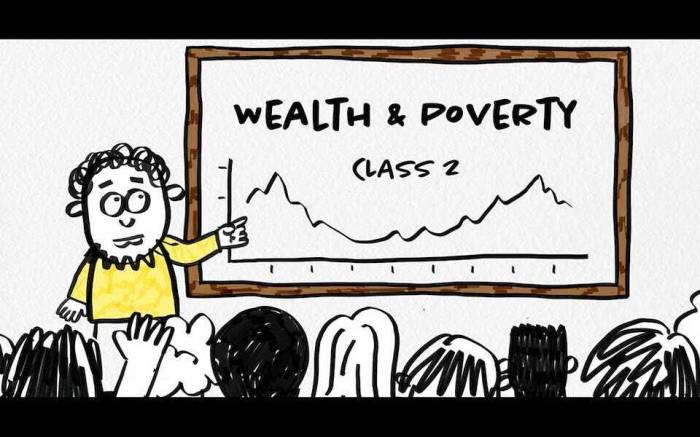Proverbs contains a balanced view of wealth and poverty – Proverbs, succinct and timeless adages, offer a nuanced and balanced perspective on the complex relationship between wealth and poverty. This exploration delves into the cultural, historical, and societal implications of proverbs, examining how they shape our attitudes and behaviors towards these fundamental aspects of human existence.
Throughout history, proverbs have served as a repository of wisdom, guiding individuals and societies in navigating the complexities of wealth and poverty. They provide insights into the causes and consequences of both, offering valuable lessons on responsible wealth management and the alleviation of poverty.
Understanding Proverbs

Proverbs are concise, popular sayings that express wisdom, truth, or advice. They originate from the collective experience and knowledge of a culture, often passed down through generations orally. Proverbs reflect the cultural, historical, and social context of the societies that created them, offering insights into values, beliefs, and norms.
Well-known proverbs related to wealth and poverty include:
- “A penny saved is a penny earned.”
- “Money talks.”
- “Poverty is not a sin.”
- “The rich get richer, and the poor get poorer.”
Wealth and Poverty in Proverbs
Proverbs Portraying Wealth Positively, Proverbs contains a balanced view of wealth and poverty
- Proverbs that emphasize the value of hard work and thrift, such as “Early to bed and early to rise, makes a man healthy, wealthy, and wise.”
- Proverbs that suggest wealth can bring comfort and security, such as “A man with money in his pocket is a man with a smile on his face.”
Proverbs Portraying Wealth Negatively
- Proverbs that warn against the dangers of greed and materialism, such as “The love of money is the root of all evil.”
- Proverbs that emphasize the importance of character over wealth, such as “A good name is more precious than gold.”
These contrasting views reflect the complex and often ambivalent attitudes towards wealth found in many cultures.
Balanced Perspective
Proverbs present a balanced view of wealth and poverty, recognizing both their potential benefits and pitfalls. They encourage moderation and responsible attitudes towards wealth, while also acknowledging the challenges and injustices associated with poverty.
For example, the proverb “Money is a good servant but a bad master” suggests that wealth should be used wisely and not allowed to control one’s life.
Societal Implications

Proverbs about wealth and poverty have significant societal implications. They shape attitudes and behaviors towards wealth distribution, influencing economic policies and social welfare systems.
For example, the proverb “The rich should help the poor” has been used to justify government programs aimed at reducing inequality.
Wisdom and Guidance: Proverbs Contains A Balanced View Of Wealth And Poverty

Proverbs offer wisdom and guidance on managing wealth and poverty. They teach lessons about responsible spending, saving, and sharing, promoting financial literacy and ethical decision-making.
For example, the proverb “Don’t put all your eggs in one basket” advises against excessive risk-taking.
Cultural and Historical Influences
Cultural and historical factors have shaped proverbs about wealth and poverty. Proverbs from different cultures and time periods reflect the values and beliefs of the societies that created them.
For example, the proverb “The rich man’s dog is better fed than the poor man’s child” highlights the stark inequalities that existed in some societies.
Illustrations and Examples
| Positive View of Wealth | Negative View of Wealth |
|---|---|
| “A penny saved is a penny earned.” | “Money is the root of all evil.” |
| “The early bird gets the worm.” | “The rich get richer, and the poor get poorer.” |
| “A man with money in his pocket is a man with a smile on his face.” | “The love of money is a dangerous thing.” |
“Poverty is not a sin, but it is a great inconvenience.”- Mark Twain
This proverb highlights the challenges and injustices associated with poverty, while also suggesting that it is not a moral failing.
The illustration below represents the balanced perspective of proverbs on wealth and poverty. It shows a scale, with wealth on one side and poverty on the other. The scale is balanced, indicating that proverbs recognize both the potential benefits and pitfalls of both.
FAQ Summary
What is the origin of proverbs?
Proverbs have ancient origins, with roots in oral traditions and cultural experiences. They have been passed down through generations, often reflecting the wisdom and observations of everyday life.
How do proverbs reflect cultural values?
Proverbs often embody the values, beliefs, and experiences of the cultures that create them. They provide insights into the social, economic, and moral norms of a particular time and place.
Can proverbs be applied to contemporary issues?
While proverbs are rooted in the past, their timeless wisdom can be applied to contemporary issues. They offer valuable lessons on human nature, social dynamics, and the challenges we face in modern society.